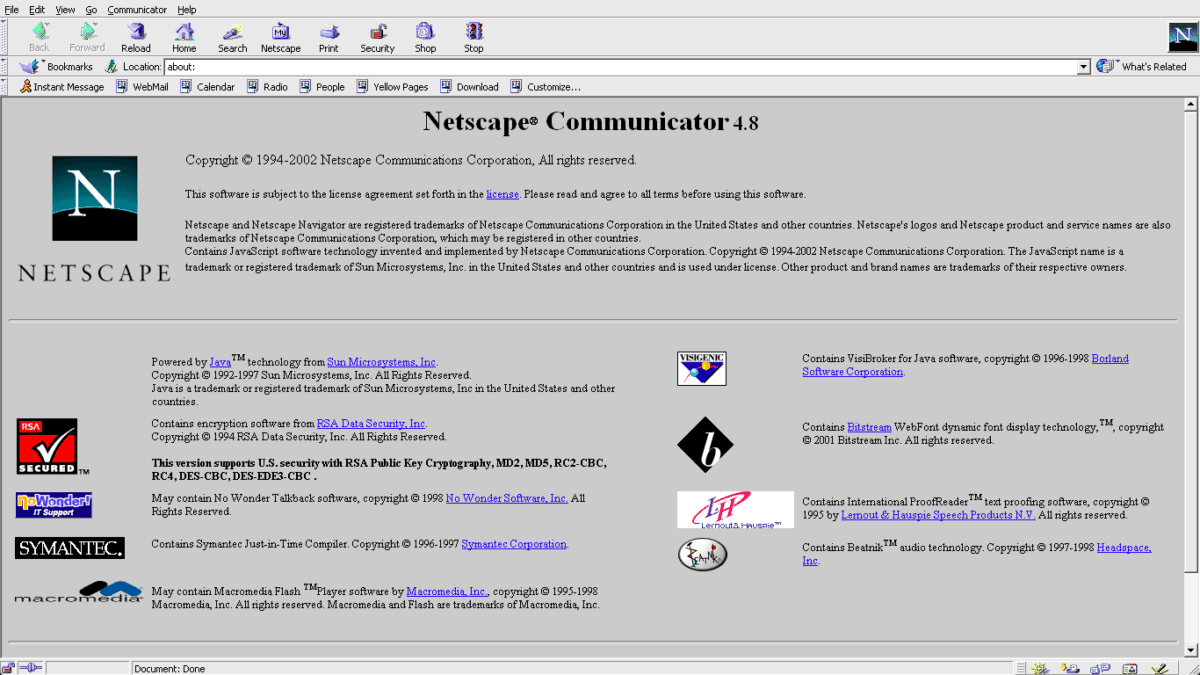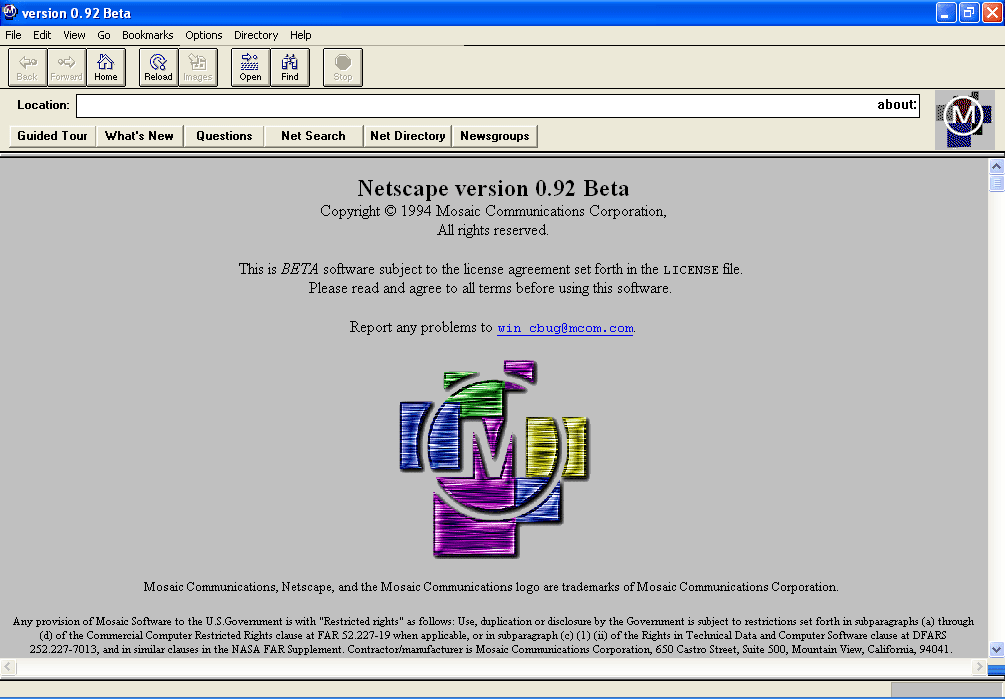When Netscape’s web browser bowed out, it went down hard. Even if you don’t recognize the name today — or simply don’t remember the kind of power it had back in the day — Netscape’s dominance was like nothing else at the time. That’s what made its eventual demise so shocking. What exactly happened to take down this web giant? And what are the real reasons why Netscape failed? Let’s take a closer look at the rise and fall of this infamous casualty of the browser wars.
Why Netscape Mattered
Imagine being the first company to think of and capitalize on the web. This is the unbelievable and honorable distinction Netscape had back in 1994. With the release of Mosaic Netscape 0.9 in October of that year, Netscape’s proprietary web browser soon dominated more than 75% of the burgeoning market. It was the Internet’s go-to web browser by a significant margin. Soon renamed Netscape Navigator, the company’s web browser was an instant success the likes of which the Internet (and the world) had never seen before.
Quick Facts
- Year Founded
- 1994
- Founders
- Marc Andreessen, James H. Clark
- Industry
- Web
- Headquarter
- Dulles, Virginia, United States
- Key People
- James L. Barksdale (CEO)
- Notable Products
- Netscape Navigator
By 1995, Netscape was ready to make an initial public offering on the New York Stock Exchange. The first day of trading saw its price per share shoot from under $15 to over $75. Profits had doubled every quarter since Netscape’s release in 1994, and this IPO saw the company’s valuation reach nearly $3 billion. This is widely considered the very thing that kicked off the start of the dot-com bubble. While Netscape’s web browser no longer exists, it still matters a bit.
Netscape Navigator Specs

| Developers | Netscape Communications Corporation, AOL |
| Product Type | Web browser |
| First Release | December 15th, 1994 |
| Final Release | February 20th, 2008 |
| Discontinued | March 1st, 2008 |
| Successor | Mozilla Firefox |
5 Must-Know Facts About Netscape
- In 1996, Netscape had over 90% of the web browser market share. By 2002, that had fallen to less than 4%.
- While Netscape is no longer in existence, Mozilla borrowed Netscape’s source code to form Firefox.
- AOL took ownership of Netscape before the turn of the millennium, which proved to be terrible timing. The dot-com bubble burst not long after, and Netscape was worth next-to-nothing of the $10 billion AOL paid for it.
- Netscape was still advertised as a discount ISP (Internet service provider) years after its shuttering as a web browser in 2008.
- Brendan Eich, an employee of Netscape, created another key element of the early world of web browsing: JavaScript.
Netscape: The Complete History

Initially founded under Mosaic Communications Corporation, the owners intended Netscape to be an online gaming network for Nintendo. Once the name changed, and the focus shifted, this simple fact became much clearer. It only took six months for Netscape to go from its founding in April of 1994 to the launch of Mosaic Netscape 0.9 in October of that same year. The release was huge, effectively changing the way the world worked with no exaggeration.
With the company’s IPO and its name change from Mosaic to Netscape Communications Corporation in the following year, Netscape further solidified its status as a revolutionary, earth-shattering concept. The mind reels trying to conceptualize life without a web browser, and even though Netscape failed eventually, we have to thank Netscape for setting the pace for future browsers. The dot-com bubble was officially beginning to inflate. Looking at the smiling faces of Netscape’s higher-ups on the cover of Time Magazine in early 1996, no one could tell the wheels were about to come off.
Early Signs of Imminent Failure
You see, the writing was on the wall almost from the get-go. Legend has it, that a group of Microsoft execs made a very important visit to Netscape HQ in the summer of 1995. According to long-standing rumors, Microsoft proposed an even divide: They handle the web browser technology solely for Windows computers, and Netscape could have the market for non-Windows computers. Netscape allegedly refused, and — later that same year — Microsoft released Internet Explorer 1.0. This was the earliest sign that Netscape’s dominance would not last forever. The browser wars had quietly been declared.
The Downfall of Netscape
Netscape had been doubling profits every quarter since going public, but by the close of 1997, this was no longer the case. Two years after Internet Explorer first came on the scene, Netscape’s profits had officially turned to losses. Their first bad quarter was not an anomaly. It soon became a pattern. Netscape had officially begun its downfall. They quickly decided to make Netscape free in January of 1998, but it was too late. Microsoft was on Internet Explorer 4.0, and countless users had made it their preferred browser of choice. There was simply no going back.
AOL announced its intentions to purchase Netscape at the end of 1998. By the time the sale went through in the spring of 1999, there was virtually no hope from within or outside either company that this merger would work. Even key figures at Netscape had immense doubts that the $10 billion purchase would help practically. They were falling too hard, and no sale could save them. By July 2003, Netscape was officially disbanded.
Reasons Why Netscape Failed
There’s a multitude of reasons why Netscape failed. No one factor singlehandedly led to its ultimate demise. In truth, it was a conglomeration of many fatal blows that inevitably buried Netscape for good. We’ll go over each of these five reasons below:
- Microsoft’s rise to power proved too much for Netscape.
- Netscape put too much focus on features over functionality.
- Despite being the first major web browser, Netscape misjudged the sheer significance the Internet would have in the future.
- Mozilla Firefox effectively became everything Netscape failed to be by using AOL money and resources to thrive while Netscape continued to flounder.
- After waiting too long to adjust its strategy in the late 1990s, Netscape just couldn’t regain its footing.
#1: Microsoft’s Rise to Power
From the start of Microsoft’s Internet Explorer, the tech giant did not charge users a cent to use their web browser. Netscape, on the other hand, did not remove costs until 1998. This gave Microsoft three years to rise to power while Netscape clung to its paid service. Before Internet Explorer came around, it made sense from a business standpoint for Netscape to charge a price to use their web browser. After all, they were the best (and practically only) option. Why not make a profit on that? Alas, Microsoft’s Internet Explorer showing up on the market for free paired with Netscape waiting three years to do the same gave Microsoft the advantage for far too long. Netscape could never recover.
#2: Netscape Lost Focus
While Internet Explorer was winning over users with its free, easy-to-use, accessible web browser, Netscape was putting too much energy into adding more features to its already busy interface. During this time, they should have been putting more work into making Netscape work as well and as affordably as Internet Explorer. It’s a diagnosis of what’s now widely known as “featuritis.” They weren’t even very useful features, either. Things like new background colors and frivolous plug-ins should not have been the focus when Internet Explorer was becoming more and more powerful by the day.
#3: Netscape Misjudged the Internet
It seems safe to say that Netscape catastrophically miscalculated what was most important about the Internet. Internet Explorer showed that the ability to browse the web can and should be free for all. Netscape didn’t get this right and ultimately took a devastating blow. Instead of putting all their attention into making the Internet more accessible, they did the opposite. They were gatekeeping the World Wide Web, while Microsoft was turning it into a free-for-all. All of this is to underline the fact that Netscape completely misjudged the potential of the Internet. It’s a weird truth coming from history’s first major web browser, but a truth nonetheless.
#4: Mozilla Fed Off Their Resources
Besides the foregoing reasons, there was also the growing rise of Mozilla Firefox for Netscape to worry about. Just before AOL took control of Netscape, some Netscape employees formed the Mozilla Organization. This group, which dedicated themselves to the protection of the Mozilla application suite, was able to thrive while Netscape struggled to survive. Not only did AOL not care that Mozilla was taking valuable attention away from them, they even helped the Mozilla Organization by giving them $2 million and a heap of valuable hardware and IP. The Firefox web browser would grow stronger as Netscape sunk deeper.
#5: Netscape Failed to Regain Footing
When Netscape figured out they were nearing rock bottom, it was too late for the once-dominant web browser to turn things around. Netscape’s collapse had reached terminal velocity, and they were skyrocketing straight toward the ground. Netscape outrightly scrapped their entire program in 1998 and attempted to start from scratch, hoping to trounce Microsoft in a last-minute buzzer beater. By then, Internet Explorer 5.0 was the market leader. There was nothing Netscape could do but fade into obscurity over the next decade.
The image featured at the top of this post is ©Ralf Liebhold/Shutterstock.com.



